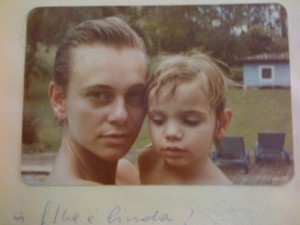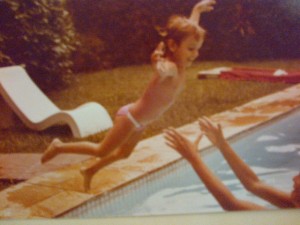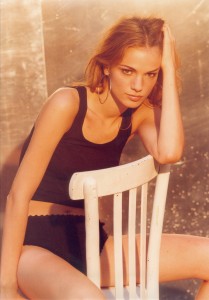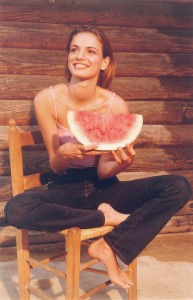


I’ll start with a phrase of Ernesto ‘Che’ Guevara, “We’re realists. We want the impossible.”
My story started on a 16 September in a wicker basket, in the southern hemisphere. My mother is Italian and my father Brazilian, and my best memories belong to Brazil, that tropical meridian, that land in the balance, suspended between dizzying contradictions. And the country of realists who want the impossible, this is where I was born.
There’s everything that I’ve learnt to be in that land of miracles, innate hardness and sensuality - nostalgic like my saudades, interior like the silences of certain wild, deserted beaches, sunny and authentic like that land that hardly ever tells lies under the feet, a dreamer as only Latin Americans can be when they tell truths’ that seem illusions, obstinate like those who’ve grown up inside enormous distances, which need good shoes and determination to reach places.
And then the opposites co-habit uninterruptedly in a dance with the flavour of other times and a wonder of synchronies.
I often remember my large house in San Paolo, and that swimming pool in the garden where I learnt first to swim and then to walk; I find my weeping willow once again, the swing where I played, the water and nature so close that they become part of you.
And I recognise my beginning enveloped in intense perfumes, in enchanted days marked by seasons that communicated with each other, contaminating each other, extending time until it becomes vague and timeless, like the child of a story by Jorge Amado, or certain suggestions of magic realism.
Getting used to Italy at just nine years of age was like fighting a cold war which had imploded inside me, Brazil was my magic interior dimension. Today, I love both my identities - European and Latin, united in the same body that, at times, exalts and at times contains, like a swinging pendulum keeping me balanced between the many facets of my life.
I sought for myself for a long time, wondering who I’d been, and who, from certain points of view, I could no longer be. I was afraid of finding myself in a new story that I didn’t yet know, and perhaps I wouldn’t have liked. But I soon realised that roots can’t be lost, and leaving your country of birth isn’t a split but a path. Leaving, I knew that I could go back, and leave again. And while leaving and returning make a mark, they also redraw the map of the soul, they fill you with energy and teach you the passion for life.
 My relationship with the future is one of trust but also diffidence. People talk too much about tomorrow and don’t listen enough to the past. The poet T. S. Eliot said that, “time past and time present both flow into future time.” So the future is the child of the past and the present.
My relationship with the future is one of trust but also diffidence. People talk too much about tomorrow and don’t listen enough to the past. The poet T. S. Eliot said that, “time past and time present both flow into future time.” So the future is the child of the past and the present.
I look ahead, but with my feet firmly in the land of my childhood, with the knowledge that what I was is what I always want to be. And I keep the little shards of my past through the love for old photographs, still writing by hand when technology risks seeing new generations unable to hold a pen and scratch paper with ink. I love remembering but also imagining what is not yet here.
Then I grew up like everyone. My adolescence saw the passage of the notes of an adagio, then a fiery presto, an impassioned allegro, returning to a sustained lento and an andante with movement, highs and lows and a great deal of impatience. I left the liceo classico (High School specialising in the classics), champing at the bit and went to live on my own. I’ve always claimed my own spaces.
As a girl, I always preferred to hide rather than show so the TIM advert of 2000 was a totally unexpected national revelation and, for two years, it kept me on a yacht circumnavigating the coasts of the Italian peninsula. It was a source of great surprise and enjoyment for me, and also uncertainty because of my age then.
It seemed a race against time, everything was going too fast for a girl like me, used to being recognised in the habit of her key points. They were years of wonder, carefree, and continual new elements yet I knew that I had to stop to still be able to feel, to understand how to reach the aims up to my expectations. So I went back to studying. I went to the Beatrice Bracco’s Teatro Blu school in Rome, the Actors’ Center with Michael Margotta, various work experiences and workshops with Greta Seacat, Bernard Hiller and Geraldine Baron, all exceptional teachers who helped me to focus my abilities and develop my talent. I spent three months at the Beverly Hills Play House in Los Angeles watching from close-up how people work in Hollywood and then in Paris with Sofia Coppola. I realised the great value of discipline and how decisive the training of preparation behind each success is through these experiences. When I came back, I went for it - I now had all the answers I was looking for.
And now, let’s browse through my books, music and films...
 The pianist Ryuichi Sakamoto, brilliant on the piano; he takes me back to the pink sunsets on board the little yacht of the TIM advert on which I sailed around Italy. Those smoked salmon canapés, that saltiness on the skin and the wind. Just women, friends and accomplices of unrepeatable moments on board. I love Gianna Nannini. Il profumo. I like the eroticism, that perfect voice, that wild feeling that goes through her notes. And then the musical meditation of the great Ennio Morricone. The Pan pipes accompanying C’era una volta in America transport me into the surreal world of the possibilities that only the cinema can give.
The pianist Ryuichi Sakamoto, brilliant on the piano; he takes me back to the pink sunsets on board the little yacht of the TIM advert on which I sailed around Italy. Those smoked salmon canapés, that saltiness on the skin and the wind. Just women, friends and accomplices of unrepeatable moments on board. I love Gianna Nannini. Il profumo. I like the eroticism, that perfect voice, that wild feeling that goes through her notes. And then the musical meditation of the great Ennio Morricone. The Pan pipes accompanying C’era una volta in America transport me into the surreal world of the possibilities that only the cinema can give.
And John Lennon, what can you say about him that hasn’t already been said? For me, Jealous guy is one of his little, unique songs, because I’m nostalgic and men are always jealous, “I was dreaming of the past, and my heart was beating fast, I began to lose control.”
I love Lucio Battisti’s Comunque Bella, a true, poignant text, written by Mogol, “Also when you came back one morning dressed in rain, with your eyes dishevelled by a night of love...” And also Shostakovich, Waltz No. 2, and Bach’s First Prelude of the Well-Tempered Clavier. And Mina, all Mina, but particularly Se telefonando because it makes me cry. And the Pixis Where is my mind because I also sometimes seem to walk with my feet in the air and my head on the ground. And Etta James’s voice - At Last is a prodigy and puts me in a good mood because if you hear it with the right spirit you can’t help believing in love. And then there’s P J Harvey, Portishead, Florence and the Machine, Vanessa Paradis, whose gypsy and French charm I love. And, ça va sans dire, all Brazilian music - Tom Jobim, Chico Buarque, Vinicius de Moraes, Joao Gilberto, Maria Betania, Gal Costa, Toquinho etc.
 My cult films, one after the other - Last Tango in Paris by Bernardo Bertolucci, Lolita and Eyes Wide Shut by Stanley Kubrick, La ragazza sul ponte by P. Le Conte, Nikita by Luc Besson, Nuovo Cinema Paradiso by Giuseppe Tornatore and Gilda by Charles Vidor, Bella di giorno by Luis Bunuel and Baghdad Café by Percy Adlon. And then there’s an Italian film - La ragazza con la pistola by Mario Monicelli and the Pasolini of Mamma Roma, and Children of a Lesser God by Randa Haines. Lastly, Paris Texas by Wim Wenders. .
My cult films, one after the other - Last Tango in Paris by Bernardo Bertolucci, Lolita and Eyes Wide Shut by Stanley Kubrick, La ragazza sul ponte by P. Le Conte, Nikita by Luc Besson, Nuovo Cinema Paradiso by Giuseppe Tornatore and Gilda by Charles Vidor, Bella di giorno by Luis Bunuel and Baghdad Café by Percy Adlon. And then there’s an Italian film - La ragazza con la pistola by Mario Monicelli and the Pasolini of Mamma Roma, and Children of a Lesser God by Randa Haines. Lastly, Paris Texas by Wim Wenders. .
However, after great indecision I must confess that I have a favourite among these masterpieces, and it’s not by accident that I put it last - Paris Texas by Wim Wenders. It’s a story of training that I saw for the first time when I was 17 and it struck me deeply. Rarefied atmospheres, long silences, interior worlds told through a look. And desolation and sensuality - the scent of seduction, naïve but aware, fragile and omnipotent of a young Nastassja Kinski in the role of Jane, behind a glass in a bar in the red light district. I would have liked to be like her, intense and lost, seductive and melancholic in her extra large pullover, waiting, behind a half-reflecting mirror that censures her horizons. .
It’s a film that made me dream that, one day, I could play roles like that, that moved me, that restored the faith in a possible creative world and still moves me talking about it now. These are the sorts of films that guide you, that tell their story through the hazy language of the unsaid, of the non-explicit heard underground that is able to amplify the contents slowly but incisively. That’s how I started to love the cinema. On an afternoon like many but not the same as all the others. I recognised the dream, and I knew what my path would be.
Wuthering Heights by Emily Bronte, Un Uomo by Oriana Fallaci, The Soul’s Code by James Hillman, Damage by Josephine Hart, Mount Analogue by René Daumal, and Love in the Time of Cholera by Gabriel García Márquez. Lastly, Alda Merini, my favourite poetess in Fiore di poesie and the great Pedro Salinas in La voz a ti debida (The Voice I Owe to You).
However, if I had to choose one book out of these, Un Uomo by Oriana Fallaci. It’s one of the most visceral and passionate books that I’ve ever read, and knowing that it tells the true love between an extraordinary woman, Oriana, and an equally absolute man, Alekos Panagulis, won me over with pain, page after page. It’s written in an overwhelming manner, without giving you space for a whimper. What it narrates goes beyond every imaginable reality. It’s a book that has been with me for a long time. At a time of passage and great renewal in my life, even after finishing the book, I reopened it, re-read it, and underlined or stole a few lines to jot down in my notebook. And for a long time it became a sort of confidante, a refuge, a voice of the soul. A piece of my life that assumed the specific weight of a cathartic text like this. There’s a passage in the book which I especially love:
 “Alekos, what does being a man mean?” “It means being courageous, having dignity. It means believing in humanity. It means loving without letting a love become an anchor. It means fighting. And winning. It’s more or less what Kipling says in that poem entitled If. And what’s a man for you?” “I’d say that a man is what you are, Alekos.”
“Alekos, what does being a man mean?” “It means being courageous, having dignity. It means believing in humanity. It means loving without letting a love become an anchor. It means fighting. And winning. It’s more or less what Kipling says in that poem entitled If. And what’s a man for you?” “I’d say that a man is what you are, Alekos.”
I’m romantic, I feel with images and reason with my emotions. I believe in reincarnation and adore angels. Things seem to make more sense in this way. There is a destiny but there’s also the ability to imagine a life for yourself and make it match the reality we build through our actions. Heraclitus docet. Habits form our destiny, day after day.
“The greatest joy is always the unexpected one.” These words are really the summary of all that I’ve said.
Thanks for reading me to this point, thanks for your time, here, in this site.
Gaia.